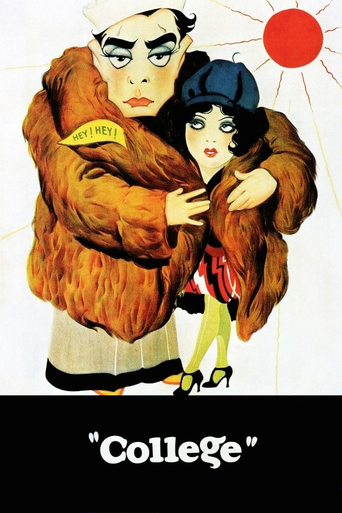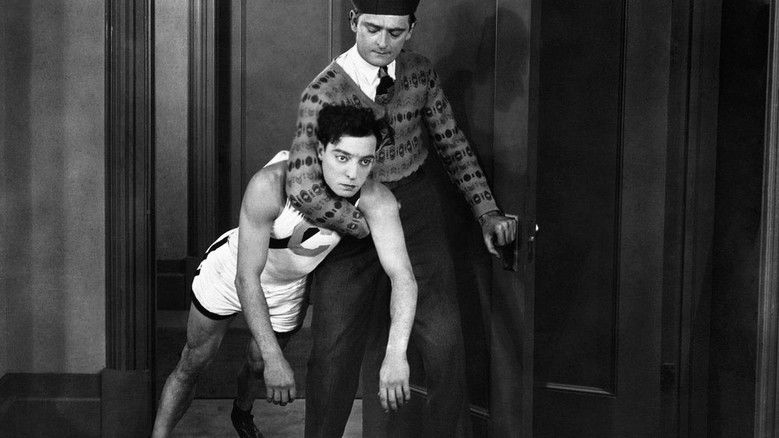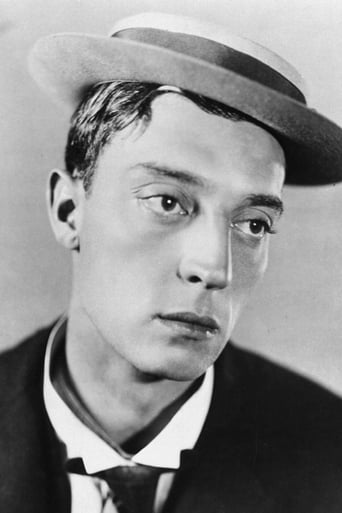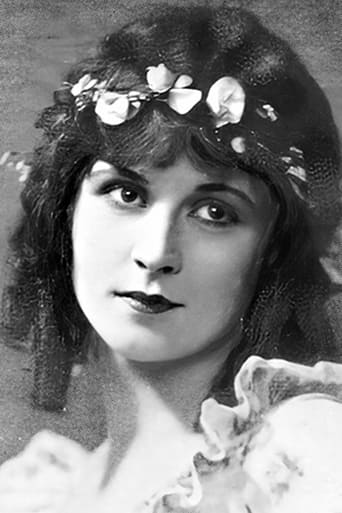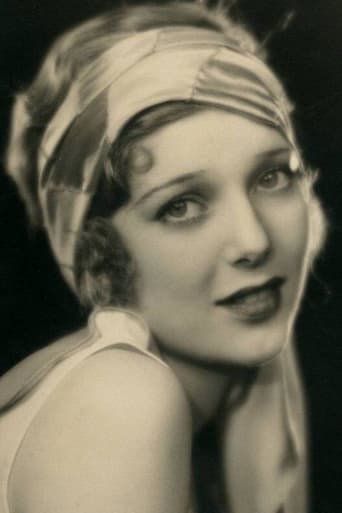College (1927)
A bookish college student dismissive of athletics is compelled to try out sports to win the affection of the girl he loves.
Watch Trailer
Cast


Reviews
A Disappointing Continuation
In truth, there is barely enough story here to make a film.
By the time the dramatic fireworks start popping off, each one feels earned.
It’s not bad or unwatchable but despite the amplitude of the spectacle, the end result is underwhelming.
This is an inferior Buster Keaton feature film. Considering how brilliant Keaton was, and how marvellous many of his feature films are, this one is a serious disappointment. I do not believe it would necessarily have been regarded that way when it came out, however. A lot of sport has flowed under the bridge since then. The film is primarily about Buster trying and failing at every conceivable sport (except football) which was common then at 'college' (the American term for university). Buster plays a bookish student who has contempt for sports but in order to try to win the heart of the girl he loves, tries to become a sportsman. In the days before sport was on television ad nauseam every single day, this would have had much more appeal than it has now. Sport historians of course would find this film fascinating, if there are any sport historians, that is. All the expected things happen: Buster tries the shot-put but cannot lift the shot and falls over under its weight, he tries the high jump but crashes into the rod, he tries the hurdles but knocks them all over, and so on. Considering that this film came between Buster's famous films THE GENERAL (1926) and STEAMBOAT BILL JR. (1928), it is remarkable that it lacks a fraction of the appeal of either of them. The DVD is good quality, with a well-restored print, so there are no quality complaints. The silent era was coming to an end, and what one can say in favour of COLLEGE is that it could never have succeeded at all in the sound era, so if Keaton really wanted to explore sports, it is just as well that he squeezed this film in just in time. It may be that other people will enjoy this film far more than myself, especially if they are fascinated by the subject, and there is no questioning the brilliance of Keaton's comic timing and technique, which are up to their usual standard. He also co-directed the film. Another reviewer has justly observed that this film resembles in theme the excellent film THE FRESHMAN (1925) by Harold Lloyd, which I would say is far more amusing than this one. These days when there are so many teen flicks about, the subject of kids going to 'college' and being 'freshmen' has little novelty, but in the twenties, it was all of great interest, especially to the dazed parents trying to understand their increasingly wild children, an anxiety clearly demonstrated by the film THE WILD PARTY (1929) starring Clara Bow in a film about girls going wild at college. People interested in seeing anything and everything that clever Buster Keaton did can, of course, not afford to miss this major film of his, as long as they are prepared to be bored by parts of it and wonder why he bothered making it.
The title reminded me of John Belushi's sweatshirt in "Animal House", but Buster Keaton's "College" is a totally different kind of movie. Keaton plays a bookish student whose girlfriend leaves him after he disses athletics in his graduation speech. Still in love with her, he decides to attend the same college that she does. From there, most of the movie is Keaton showing off his physical humor.There is one very politically incorrect scene, but I suspect that the sign on the restaurant is an accurate depiction of that era. The best parts are the scenes where Keaton attempts to play sports. They must have really had fun filming the boat race.So, even though this isn't Keaton's best movie, there's no shortage of laughs. The soda fountain was certainly a hoot (as are the scenes of pranks at the hands of the other students). Definitely worth seeing.
Ronald, the Boy (Buster Keaton) has his eyes on one gal only at his high school graduation, Mary (Ann Cornwall). But, alas, she is the girlfriend of the best athlete in the school. Ronald, the top scholar, tries to put down sports in favor of academics, in his valedictorian speech. Wow, does he ruffle a few feathers, even though Mary may take some of his speech to heart. As this young woman and her present beau are going to a nearby college in California, Ronald convinces his mother that he can work his way through school and attend the same school. Once there, though, Ronald is put down for his job as a soda jerk and his lack of athletic prowess. In order to claim Mary's affections and silence the bullies, Ronnie launches a brave attempt to make any and every team available, from baseball to track-n-field. The results are what you might expect. Or are they? This silent classic is a keeper for the ages. Keaton is one truly funny and physical comedian. Just watch him try the discus, where the metal frisbie takes off the wig of a bigwig, or the high jump, where he lands "planted" in the ground and the giggles will flow like the Mississippi. Cornwall and the other cast members are wonderful as well. Then, too, the novelty of reading the screen for cues and listening to the expressive music of the times makes it a must-see. Its surprising, however, how little human nature changes over time, as much of the story will seem to hit home for every viewer. If you are at all interested in the silent movie era, this is a great place to start your journey into the beginnings of the cinematic age. Your appetite and appreciation for the times, and for Keaton, will grow by leaps and bounds.
The sophomoric 1927 Buster Keaton silent comedy "College" lacks the overall creativity of "The General" (1927), "Steamboat Bill, Jr.," (1928) and "The Cameraman" (1928). Buster's gags and routines are tame compared with the three aforementioned epics. Nevertheless, "College" isn't completely without merit. The irony, for example, is that the physically fit Buster plays a protagonist without any athletic ability until the villain endangers our hero's sweetheart. Like Charles Chaplin, Buster exploited incongruity as the source for his comedy. "College" is basically your boy wants girl, boy loses girl, and then boy wins girl nonsense. "On the sunkist slopes of the Pacific where land and water meetCalifornia" reads the opening title card. Rain pelts Union High School auditorium as people huddle under newspapers and umbrellas. The opening 10 minute-plus scene depicts Buster's high school graduation day "where the next step is either to go to college or go to work." Buster arrives at graduation with his mother. Although Ronald has brought an umbrella, his cheap $15 suit shrinks up on him as that he looks ridiculous. This gag and his problems closing an umbrella gag are clever and cute. This is the most non-traditional graduation because nobody wears caps and gowns. They had to otherwise everybody would have looked the same and we would never have seen Buster's suit shrink. All in all, this is the most thought out and calculated sequence in "College."Mary Haynesthe heroine--has a memorable introduction. The male students remove several coats that they had generously allowed her to bundle up in to avoid getting drenched. She is described as "the winner of every popular contest in which the boys were allowed to vote. When she receives his diploma, the principal predicts that she will fit in at Clayton College as she did at Union High School. Star athlete Jeff Brown (Harold Goodwin) appears amid fanfare. He is described "as a man who loved exercise so much that he has made many a girl walk home." When the principal hands Jeff his diploma, he notes that Jeff took seven years to earn it. Lastly, the principal congratulates Buster for being "the most brilliant scholar." Of course, everybody laughs at Buster because his suit has shrunken so much that the buttons on his vest have popped off and his sleeves have retreated virtually to his elbows. Buster alienates everybody at graduation with his anti-athletic speech. As the top student, he receives an honor medal. "The student who wastes his time on athletics rather than study show only ignorance." His words anger Jeff and the other fellows. "Future generations depend upon brains and not upon jumping the discus or hurdling the javelin." Mary (Anne Cornwall) criticizes Ronald. "When you change your mind about athletics then I'll change my mind about you." She rides away with Jeff.Mary enters Clayton College. Neither Ronald nor his mother can afford the tuition, so Ronald looks for a job so he can work his way through school. He gets a temporary job as a soda jerk clerk. He carries a picture of Mary around in his suitcase and boards in the dormitory. The soda clerk job doesn't last long because Ronald is afraid that Mary will see him in such a lowly job and ridicule him so he quits.Dean Edwards (Snitz Edwards) congratulates Ronald about his maturity. He praises him, "A boy like you can make this athlete infested college a seat of learning once more." Eventually, Ronald quits his soda jerk job when Mary enters the shop. Ronald decides he wants to take a try at sports. Ronald gets on the baseball team and his idiotic antics result in his team losing. Jeff and some guys catch him walking home from the disastrous baseball game and toss him on a blanket in the air. He sails so high that he can see an old battle axe dressing through her balcony window. Infuriated, she storms onto the balcony and swats at him with an umbrella. More umbrella buffoonery! He seizes the umbrella and floats up and down until he tears down a balcony and brings down the battle axe on it. Ronald tries out for track and other related athletics and again fails miserably. Pay close attention to these shenanigans because they play an important part in the conclusion. Looking for work, Buster masquerades as an African-American in a restaurant. The black paint on his face smears off when he is serving Jeff and Mary on a date. When the blacks discover that he's an imposter, they run him off. Eventually, the Dean summons our hero to his office and complains about Ronald's failing grades. "I took up athletics because the girl I love thinks I'm a weakling," Buster explains in his own defense. The Dean requests that the rowing coach make Buster the coxswain on the rowboat team. The coach, however, has other ideas and he slips Buster a mickey. Things don't work out for the coach and the person intended to replace Buster gulps the potion. The photography for the boat rowing race is incredibly good. One of the boats has the semi-profane name 'Damfino.' This too must have been pretty risqué for its day.Ultimately, Jeff shows his true antagonistic colors when he locks Mary in her dorm room and stays with her. She warns him that his being caught in her room will mean expulsion for both of them. Jeff points out that he has been expelled already. Mary calls Ronald for help and he responds with alacrity. The last nine minutes of "College" portray Ronald as an entirely different kind of guy and the ending is truly odd. Again, "College" is not top-notch Keaton, but it is worth watching and the DVD is available in a Kino International print on Genius Entertainment for under a dollar in some stores.

